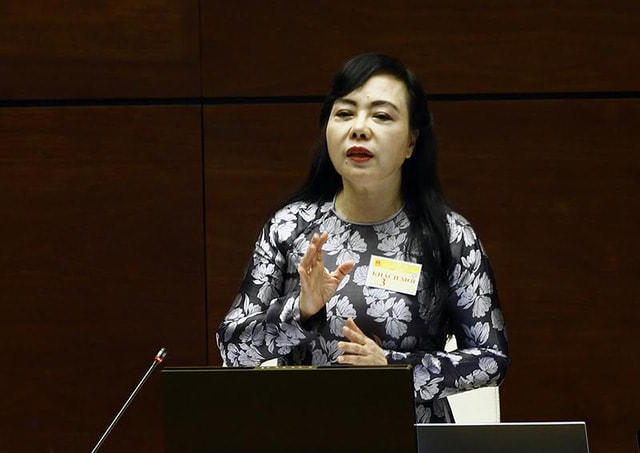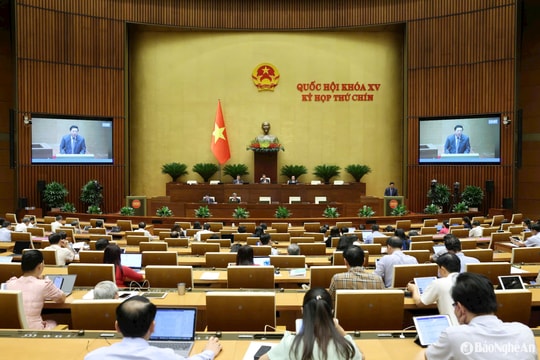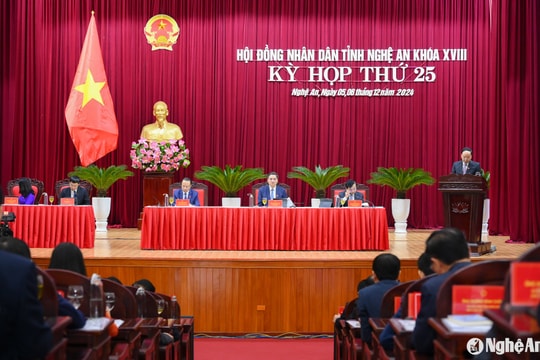More than 7,000 medical staff have been disciplined.
During the question-and-answer session this morning at the National Assembly, Health Minister Nguyen Thi Kim Tien said that more than 7,000 medical staff have been disciplined, from reprimands to dismissal from the profession, in an effort to change the service style and attitude of medical staff towards patients.
 |
| Minister of Health in the hot seat. Photo: Phuc Hung |
At 10:10 a.m. this morning (June 14), Minister of Health Nguyen Thi Kim Tien was the second person to answer questions at the 3rd session of the 14th National Assembly.
National Assembly Chairwoman Nguyen Thi Kim Ngan said that 58 delegates will question the Minister of Health on four groups of issues: Current situation and solutions to improve the quality and effectiveness of medical examination and treatment; Drug prices and state management of drug prices and drug supply at medical examination and treatment facilities; Investment in grassroots health care to reduce the burden on upper-level hospitals; Current situation of grassroots health care staff, especially in mountainous areas and areas with particularly difficult economic conditions.
In response to questions from the first six voters participating in the questioning, the Minister of Health divided the content into groups to answer.
Regarding the management of health sector officials, delegate Nguyen Chien (Hanoi) asked the Minister of Health to inform him of any regular measures taken to improve the service style of health workers. According to patients' feedback, there are nurses who use rude, if not insulting, language towards patients; while in other countries, health workers even thank patients.
Also raising a similar issue was delegate Nguyen Thi Le Thuy (Ben Tre) with the question of what solutions could be found to improve attitudes to match the increase in hospital fees.
Minister of Health Nguyen Thi Kim Tien immediately affirmed: The problem of attitude and style as mentioned by the delegates does exist, but it is a phenomenon of "one bad apple spoiling the barrel" - somewhere there are medical staff with bad medical attitudes.
The Minister said that the industry has had many comprehensive solutions to innovate the service style and attitude of medical staff, from propaganda and mobilization to hotlines, suggestion boxes, installing surveillance cameras, strengthening professional supervision and having a circular on strict penalties... As a result, 7,000 medical staff have been disciplined with many different forms, from warnings, reprimands to the highest level of expulsion from the industry in the past time.
In addition, the financial mechanism has been innovated to increase the income of health workers, helping to increase income and create comprehensive innovation. According to the independent assessment of international organizations UNDP, the PAPI index has improved significantly at the provincial and commune levels.
High prices of specialty drugs are a true reflection
Regarding pharmaceutical management, delegate Nguyen Chien (Hanoi delegation) and delegate Trinh Ngoc Phuong (Tay Ninh) raised questions about import management measures, improving the quality of machinery and equipment and ensuring drug safety in response to the audit representative's report on May 23 about the discovery of many devices that had not fully depreciated, were broken after being used, machines had to be covered up, the same medical supplies were approved by the Ministry of Health at many different prices, some up to 7 times; ...
Responding to this issue, Minister of Health Nguyen Thi Kim Tien admitted that there were cases of outpatients buying medicine at hospital pharmacies at a higher price than the medicine prescribed by doctors during inpatient treatment.
However, she said that according to regulations, the price of drugs sold by the hospital can only be 10-15% higher than the winning bid price. Meanwhile, the drugs at the hospital pharmacy are purchased from other sources, which affects the price.
The Minister affirmed that she will issue a Circular requiring hospital pharmacies to sell at the correct price as stipulated in the hospital's winning bid. Accordingly, the price of hospital pharmacies' drugs must be equal to the price of the hospital's drugs.
The prices of drugs at retail pharmacies will have to follow market rules. Where drugs are of good quality and cheap, there will be many buyers. In particular, if there is a large price difference, there will be interdisciplinary inspection forces. The Ministry of Health will receive opinions and coordinate with forces to resolve the issue.
In general, since the Circular on synchronization and implementation of the Law on Bidding was issued, the drug market has been stable and drugs have not increased dramatically (shown through CPI ranking 9-10).
In addition, according to a recent independent assessment by the International Monetary Fund (IMF), the prices of branded drugs in Vietnam are 10% lower than the average of 6 ASEAN countries. Meanwhile, prices in the Philippines and Thailand are 37% and 19% higher, respectively. In particular, generic drugs for diseases such as cancer, cardiovascular disease, and diabetes in Vietnam are 33% lower, while in the Philippines and Indonesia they are 72% and 20% higher, respectively.
However, according to the Minister, what needs to be adjusted is the price of the drug. “The high price of the drug is a correct reflection,” said Ms. Tien.
Because of copyright, branded drugs are very exclusive, focusing on specialized drugs for cancer and cardiovascular diseases. Currently, there are 700 branded drugs, 500 branded drugs whose copyright is almost gone. "We will propose to adjust Circular 11 so that drugs whose copyright is almost gone will be put up for bidding. Bidding will help reduce drug prices. Currently, it has been reduced by 30%, we are striving to reduce drug prices by another 10%.
Auditors have the right to conclude but medical facilities do not agree
Regarding the issue of many devices being broken before their depreciation period, the Minister said: This is due to the excessive usage capacity, even at the provincial level. The reason is that the budget cannot buy enough machines while places with a large number of patients should buy more machines.
Some of the machines that are under inspection are under warranty (waiting for replacement equipment to arrive from abroad).
Regarding the audit's conclusion that the prices of drugs and medical equipment are different between medical facilities, Ms. Kim Tien said: "The audit has the right to conclude, but the medical facilities do not agree."
The Minister explained: Medical equipment is very diverse in types and models. For example, with the same name as Butterfly Needle, Viet Duc Hospital bought it for only 6,500 but at Cho Ray Hospital it was 7 times more. Because the butterfly needle of Cho Ray Hospital has a lock, valve, and a more beveled tip, to avoid pain for organ transplant patients; Similarly, the infusion line and chemicals have different names but different functions... In addition, according to the assessment of the Ministry of Health inspector, the prices of medical equipment are the lowest because there are very clear regulations and decrees.
However, the Ministry of Health will continue to supplement stricter equipment purchasing procedures; decentralize authority to public service units. In the near future, the Law on Equipment Management will be issued.
According to Dan Tri
| RELATED NEWS |
|---|

![[Trực tiếp] Phiên chất vấn và trả lời chất vấn, Kỳ họp thứ 31, Hội đồng Nhân dân tỉnh Nghệ An khóa XVIII [Trực tiếp] Phiên chất vấn và trả lời chất vấn, Kỳ họp thứ 31, Hội đồng Nhân dân tỉnh Nghệ An khóa XVIII](https://bna.1cdn.vn/thumbs/540x360/2025/07/10/z6788966906184_c4fcf742cb54b169f79f1fd8e742be73.jpg)






